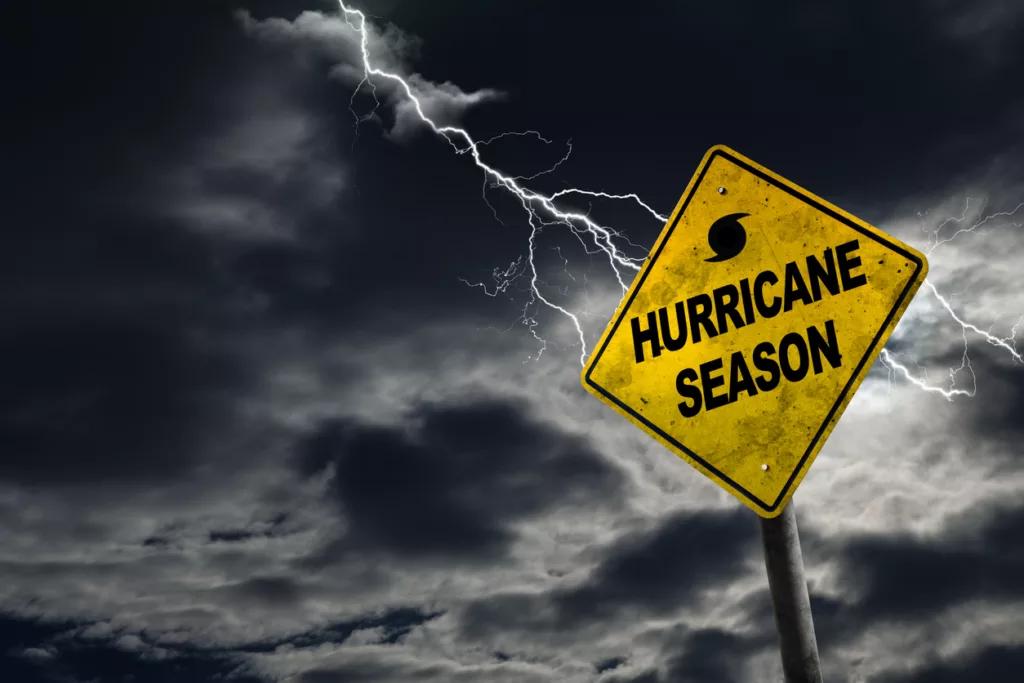Preparing for the 2023 Hurricane Season

Hurricane Season June 1 through November 30
Preparing for the 2023 Hurricane Season. Living in Florida offers many benefits and advantages, but be sure to thoroughly prepare for the 2023 Atlantic Hurricane Season starting June 1. After assessing damages done from hurricanes in the past few years, Floridians are encouraged to have at least 7 days of supplies. These supplies include food, water, medicine, batteries, etc. Each family and business is advised to be adequately stocked and prepared to face this hurricane season.
During the past three years, four hurricanes have made landfall in Florida, including Hurricane Michael, the first hurricane to make landfall in the U.S. as a Category 5 since Hurricane Andrew in 1992. If you are unsure of what to do when disaster strikes, make a plan today.
If you are an owner of a business and want to ensure that you will be able to continue business after a disaster, visit floridadisaster.org/business/planning-for-businesses/ to get started on planning.
For information about planning for any disaster and for disaster preparedness tips, visit www.ready.gov/.
Source: https://www.floridadisaster.org/planprepare/preparing-for-hurricane-season/
Title: Florida Preparing for the 2023 Hurricane Season: Essential Steps to Ensure Safety and Resilience
Introduction
As the 2023 hurricane season approaches, Florida is gearing up to protect its residents and properties from potential devastation. With a history of facing powerful storms, the state understands the importance of thorough preparation. In this article, we will explore crucial steps Floridians can take to ensure their safety and resilience during hurricane season.
Stay Informed and Create a Plan
One of the most important aspects of hurricane preparedness is staying informed about potential storms and developing a comprehensive plan. Keep track of updates from reliable sources such as the National Hurricane Center (NHC) and local authorities. Create an emergency plan that includes evacuation routes, communication strategies, and essential supplies. Make sure every family member understands the plan and knows their responsibilities.
Secure Your Property
Preparing your property ahead of time can significantly reduce potential damage caused by hurricanes. Trim trees and shrubs, remove loose branches, and secure outdoor furniture and equipment. Reinforce windows and doors with storm shutters or plywood. Check the integrity of your roof and repair any existing damages. Clear gutters and drains to prevent blockages. If you live in a flood-prone area, consider installing flood barriers or purchasing flood insurance.
Stock Up on Supplies
When a hurricane hits, access to basic necessities may be limited. Build an emergency supply kit that includes non-perishable food, drinking water, flashlights, batteries, a first aid kit, necessary medications, and hygiene products. Have a sufficient supply of pet food and other essentials for your pets. Keep important documents such as identification, insurance papers, and medical records in a waterproof container. Don’t forget to include cash and a portable phone charger in your emergency kit.
Review Insurance Coverage
Before the hurricane season starts, review your insurance policies, particularly your homeowner’s or renter’s insurance. Understand the coverage and exclusions related to hurricane damage. Consider purchasing additional coverage if needed, such as flood insurance. Document your valuable possessions through photographs or videos to simplify the claims process in case of damage. Keep copies of insurance policies, contact information, and claim forms in a secure location.
Evacuation Planning
In certain situations, evacuation may be necessary for your safety. Know the evacuation routes designated by local authorities and plan your departure accordingly. Determine your evacuation destination, whether it’s a designated shelter, the home of a friend or family member, or a hotel outside the affected area. Pack essential items, including your emergency supply kit, important documents, and a means of identification. Follow instructions from local authorities and leave early if advised.
Conclusion
Preparing for the 2023 hurricane season in Florida is a crucial task that requires diligence and foresight. Staying informed, creating a comprehensive plan, securing your property, stocking up on supplies, reviewing insurance coverage, and understanding evacuation procedures are all vital steps toward ensuring the safety and resilience of yourself and your loved ones. By taking these precautions and being prepared, Floridians can mitigate potential risks and navigate the hurricane season with greater peace of mind. Remember, preparedness is the key to minimizing the impact of hurricanes and safeguarding your well-being.


Comments are closed